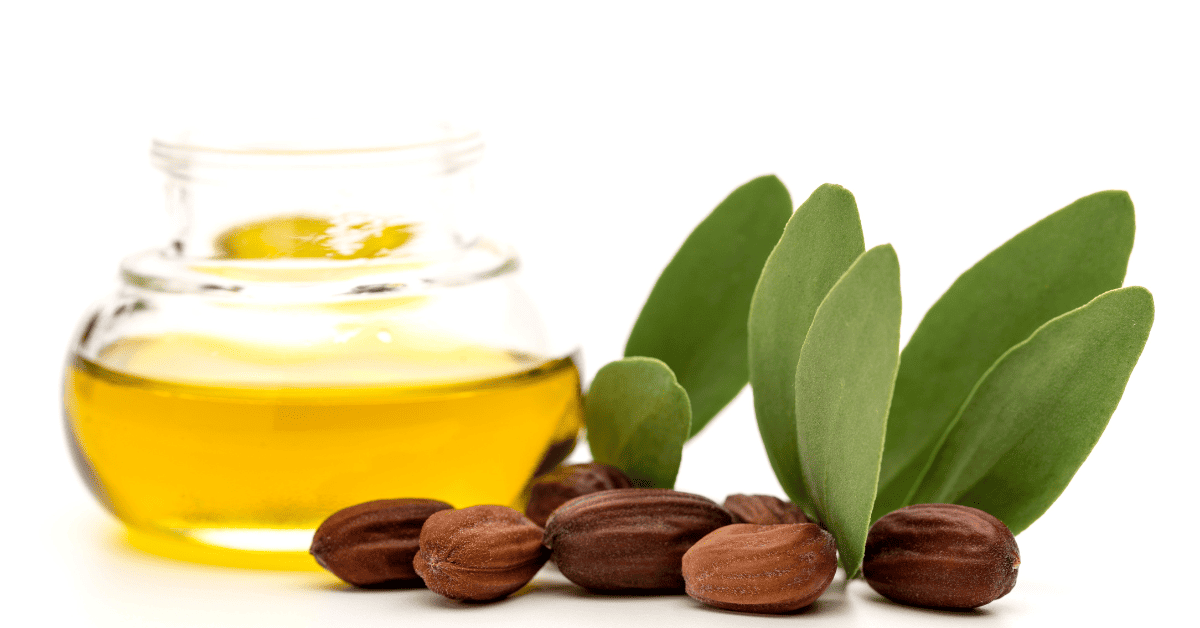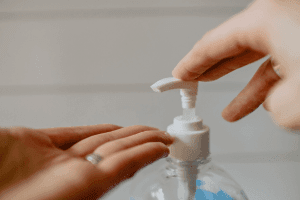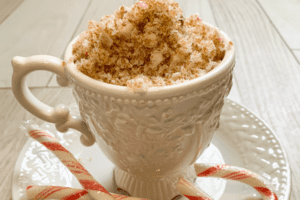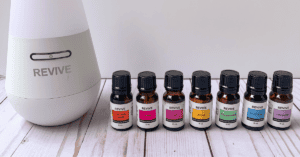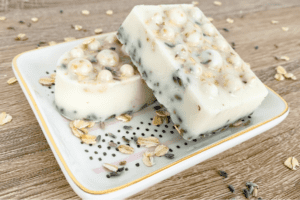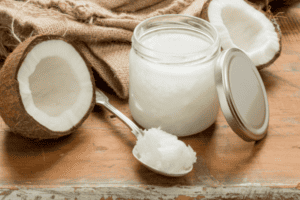Jojoba Oil Vs. Argan Oil | A Guide for Hair and Skin in 2024
Learn the difference between jojoba oil vs. argan oil so you can make an informed decision for a healthier glow in 2024.
Get ready to dive into the world of natural oils! Today, we’ll explore two game-changers: Jojoba Oil and Argan Oil.
These oils have been causing a stir in the beauty industry with their amazing benefits for hair and skin. Choosing between them can be tough, but don’t worry, I’ve got you covered.
This post contains affiliate links. You can learn more here.
Pin this image for later!

In this post, we’ll cover:
- Unique qualities of Jojoba Oil
- Standout properties of Argan Oil
- Benefits of each oil for hair care
- Advantages of each oil for skin health
- Choosing between Jojoba and Argan oil based on individual needs
My goal? Equipping you with all the info to pick your ultimate sidekick for radiant skin and lustrous hair.
Remember, glowing skin and shiny hair take time and consistent effort. Stick with me through this guide, and by the end, you’ll have the knowledge to make the best choice for your beauty needs!
Jojoba Oil and Argan Oil – What Are They?
But wait, what exactly are these oils, you ask? Well, before we dive into the wonderful benefits and uses of Jojoba and Argan oil, let’s take a moment to understand what they are and where they come from.
These amazing oils, derived from nature itself, each have their own special composition and rich history of use. And let me tell you, they work wonders for your hair and skin!
Jojoba Oil
Jojoba Oil, pronounced ho-ho-ba, is derived from the seeds of the Jojoba plant (Simmondsia chinensis), a shrub native to the southwestern United States and northern Mexico.
It closely resembles sebum, the waxy substance produced by our skin glands, making it a natural skin conditioner. This is a critical reason why jojoba oil works so well!
Here are some ways to use Jojoba Oil:
- Moisturizer: Apply a few drops of Jojoba Oil directly to clean skin to hydrate and seal in moisture.
- Hair conditioner: Massage a few drops of Jojoba Oil into your scalp before shampooing for healthier hair.
- Makeup remover: Use Jojoba Oil as a natural makeup remover by applying a few drops to a cotton pad and wiping over your face.
- Lip balm: Apply a small amount to your lips for soft and moisturized lips.
Remember, a little goes a long way. Always do a patch test before regular use to check for allergic reactions. I’ve use jojoba oil for all of these things and I absolutely loved it!
Argan Oil
Argan Oil, also known as ‘liquid gold,’ is derived from the kernels of the Argan tree (Argania spinosa), native to Morocco.
This oil, rich in nutrients like fatty acids and vitamin E, is highly beneficial for hair and skin. Berber women of Morocco have used it for centuries in both cooking and cosmetics.
Here are some ways to incorporate Argan Oil into your beauty routine:
- Moisturizer: Its high Vitamin E and fatty acid content makes pure Argan oil great for naturally boosting the skin. Apply a few drops and gently massage it into your skin before bedtime.
- Hair treatment: To tame frizz and add shine, rub a few drops of Argan oil in your hands and comb it through your hair, focusing on the ends where damage is most common.
- Exfoliating lip scrub: Create a moisturizing lip scrub by mixing a few drops of Argan oil with brown sugar and vanilla extract.
- Nail and cuticle treatment: Hydrate and soften cuticles by massaging a drop of Argan oil into each one.
Argan oil has also been a huge multi-purpose oil for me over the years! Just remember to conduct a patch test on your skin before regular use to check for any adverse reactions.
Here’s Why I Use Both, Jojoba Oil and Argan Oil
I love using Jojoba Oil and Argan Oil from REVIVE Essential Oils! Their therapeutic grade oils are affordable and high quality.
Jojoba Oil is perfect for hair treatments, making it feel silky soft. It’s also a great makeup remover. Argan Oil served as my facial moisturizer during my college days, saving me money when I was in the midst of switching over to safer products.
Both Argan Oil and Jojoba Oil are used for health and beauty purposes by natural beauty enthusiasts for their skin, hair, and overall health benefits.
Trust me, I can’t live without them! And if you want to give them a try, you can use the code Essential10 at checkout for 10% off your first order 🙂
Argan Oil vs Jojoba Oil For The Hair
When it comes to achieving gorgeous, healthy hair, the ongoing debate between Jojoba Oil and Argan Oil never seems to end. These oils have different strengths and purposes in hair care, but how do we determine which one is better for specific aspects of our hair routine?
In this section, we’ll explore the benefits of each oil and compare their effectiveness in addressing different hair concerns.
So, whether you’re battling itchy scalp, dry hair, frizz, or lackluster locks, keep reading to find the oil that could become your hair’s new BFF!
But if you’re in a rush, here’s a handy little graphic that summarized everything for you. And you can pin it for later if that’s your thing!

Argan Oil vs Jojoba Oil: Which One Is a Better Moisturizer?
Both Jojoba Oil and Argan Oil are excellent moisturizers with different benefits.
Jojoba Oil mimics the natural oils produced by our scalp, balancing oil production and promoting hair health.
Argan Oil, rich in antioxidants and fatty acids, hydrates and revitalizes dry, damaged hair.
For oily or greasy hair, Jojoba Oil is the best choice. Use organic Argan Oil for dryness or damage on your ends.
Does Argan Oil or Jojoba Oil Prevent Dandruff Better?
When it comes to fighting dandruff, Jojoba Oil is the winner!
Its composition is similar to the natural oil produced by our scalp, called sebum. This means it can calm an irritated scalp, reduce inflammation, and control excess oil production – all factors in dandruff.
Plus, Jojoba Oil’s antibacterial properties really can be a game-changer for dandruff caused by a yeast-like fungus.
Don’t get me wrong, argan oil can also soothe the dry scalp and irritation that come with dandruff.
But Jojoba Oil targets the root causes better. If you want to keep dandruff at bay, go for Jojoba Oil!
Which One Protects Your Hair Better?
When it comes to protecting your hair, both Jojoba Oil and Argan Oil have you covered!
Argan Oil contains antioxidants that shield against heat damage, pollution, and harmful UV rays. It also adds shine and elasticity, preventing breakage.
Jojoba Oil creates a protective layer, locking in moisture and defending against dryness. It even promotes hair thickness and prevents loss.
Whether you need defense against the elements or a moisture boost, both Argan oil and Jojoba Oil has your back! I highly recommend you mix both together and create a lovely hair oil for growth and overall health.
Does Jojoba Oil or Argan Oil Help Your Hair Grow Better?
Both Argan and Jojoba Oil promotes hair growth, but they work in different ways.
Argan Oil hydrates and softens hair with antioxidants, essential fatty acids, and Vitamin E. It boosts scalp health and creates a moisturized environment for your hair.
In contrast, Jojoba Oil fights dryness, dandruff, and scalp psoriasis. It mimics natural oils, stimulating growth naturally. It’s rich in B-vitamins, Vitamin E, and Zinc, nourishing the scalp and hair follicles.
To repair and thicken existing hair, use Argan Oil. For natural hair growth and scalp health, choose Jojoba Oil.
Ultimately, the choice depends on your specific hair needs. But either one will definitely get the job done!
Which One is Better for Fine Hair?
If you have fine hair, Jojoba Oil is perfect! It’s lightweight and won’t weigh down your hair, giving you volume and bounce.
It also matches the different natural oils in your scalp, providing hydration and nourishment without feeling greasy.
And guess what? Over time, Jojoba Oil helps make your hair thicker and stronger too! How cool is that?! So if you want to show your fine hair some love, go for Jojoba Oil!
I personally have very fine hair and it loves jojoba oil. It’s the only kind of oil that my hair actually absorbs without being overly greasy.
I don’t put argan oil on my scalp, but I will put it on my ends if it’s diluted with jojoba oil!
Argan Oil vs Jojoba Oil: Which One is Better for Course Hair?
Argan Oil is the ideal choice for coarser hair texture. Its dense texture deeply moisturizes and softens dry, tough hair.
Packed with Vitamin E and essential fatty acids, it replenishes moisture, enhances elasticity, and promotes smoother, healthier-looking hair.
The antioxidants in Argan Oil protect against damage, crucial for coarse hair prone to breakage and split ends.
Incorporating Argan Oil into your hair care routine can be a game-changer for coarse hair!
Which One is Better for Damaged Hair?
For damaged hair, both Argan and Jojoba Oil help, but if I had to choose one, Argan Oil emerges as the front-runner.
Argan oil is rich in Vitamin E and essential fatty acids, which repair damaged hair and restore its health. It penetrates deep into the hair strands, rectifying damage from within and revitalizing the hair.
Its antioxidants also form a protective shield, preventing further damage from external factors. You can even use it as a heat protectant!
So, if you’re struggling with damaged hair, Argan Oil might be your new best friend!
Which One Treats Hair Loss Better?
When it comes to treating hair loss, both oils have advantages.
However, Jojoba Oil may have an edge in this area. It stimulates hair growth by unclogging follicles and creating a healthy scalp environment.
Jojoba Oil is rich in vitamins and minerals that nourish hair, including Vitamin C, B , and E, Copper, and Zinc.
So, if hair loss concerns you, give Jojoba Oil a try! Or if you’re looking for something that’s heavy-duty but still natural, you should try a rosemary hair spray or Vegamour products.
Which One Calms Frizzy Hair Better?
Say goodbye to frizzy hair with Argan Oil!
This divine elixir tames wild strands, thanks to its high content of fatty acids and antioxidants. It hydrates and moisturizes from root to tip, sealing in moisture and closing cuticles for smooth, manageable hair.
Argan Oil is your hair’s superhero against frizz! I highly recommend putting a tiny bit on your fingertips and using it to smooth your hair after pulling it up to prevent flyaways.
Which One Is Best for Your Hair Follicles?
When it comes to hair follicle health, both Jojoba Oil and Argan Oil are great.
Jojoba Oil has a slight edge as it mimics the natural oil sebum, keeping the hair moisturized and promoting a healthy scalp. It also helps unclog hair follicles, aiding hair growth.
Don’t forget about Argan Oil though! It has amazing conditioning properties.
Ultimately, it depends on your preference and hair type!
Argan Oil vs Jojoba Oil For The Skin
Let’s explore how Argan Oil and Jojoba Oil can revolutionize your skincare routine! Discover which oil is ideal for specific skin conditions.
Whether you have dry skin, oily skin, mature skin, or acne prone skin, find your skin’s best friend.
Read on to nourish and pamper your deserving skin! Or check out the graphic below:

Which One Treats Eczema Better?
Jojoba Oil and Argan Oil offer incredible benefits for Eczema.
Jojoba Oil reduces redness caused by dryness and other skin conditions, moisturizes without clogging pores, and restores natural balance.
Argan Oil repairs damaged skin, prevents dry skin and irritation, and heals damaged skin cells. Choose either oil based on your skin’s specific needs and reactions. Both are excellent choices for combating Eczema!
Which One Soothes Cuticles Better?
Both Jojoba Oil and Argan Oil are great for cuticle care!
Jojoba Oil deeply hydrates and softens your cuticles, while its high iodine content fights bacteria.
Argan Oil, rich in Vitamin E, revitalizes your nails and keeps your cuticles moisturized.
Ultimately, it comes down to personal preference and how your skin reacts to each oil. Keep pampering your hands and nails, because they deserve that TLC!
I have a DIY cuticle oil recipe handy just for you! And you can totally use both oils if you want to!
Argan Oil vs Jojoba Oil: Which One Softens Cracked Heels Better?
For stubborn cracked heels, both oils work wonders!
Jojoba Oil deeply moisturizes, soothing and softening your tired feet. It’s packed with vitamins E and B, repairing damaged skin cells and leaving your skin smooth.
Argan Oil, rich in Vitamin E and essential fatty acids, hydrates, heals cracks, and leaves your feet soft and supple.
You can totally mix both oils together to make a fantastic remedy. Remember to exfoliate first, then apply a few drops of your chosen oil, massaging it in. Pop some socks on and go to sleep for the night. Your heels should be glowing by morning!
Which Oil Treats Razor Burn Better?
Jojoba and Argan oils soothe irritated skin caused by razor burn. Jojoba Oil closely resembles our skin’s natural oils, restoring balance and reducing redness and itching.
On the other hand, Argan Oil is rich in Vitamin E and fatty acids, acting as a natural anti-inflammatory and promoting faster skin healing.
So, either way, you’re covered. Just apply a few drops of your chosen oil right after shaving for remarkable results! Key word: right after! It’s great for prevention. I have more nontoxic shaving tips right here.
And if you need something a little more heavy-duty, I have a super easy and effective razor burn remedy! I get them all the time and this is the only thing that helps.
Which One Offers Sun Protection?
Sun protection is a must!
But can Jojoba or Argan Oil help? Both oils do have natural properties for sun protection.
Jojoba Oil has natural iodine to guard against harmful bacteria. Argan Oil is rich in antioxidants, fighting damage from UV exposure.
But remember, these oils don’t have SPF, so they don’t replace regular sunscreen. Use them as a complement to keep your skin healthy and radiant!
Argan vs Jojoba Oil: Which One Treats Stretch Marks Better?
For treating stretch marks, both Jojoba and Argan oils are beneficial.
Jojoba oil hydrates the skin, promotes elasticity, and improves stretch mark texture over time.
Similarly, Argan oil, rich in Vitamin E and antioxidants, repairs damaged skin cells, reducing stretch mark appearance.
However, these oils aren’t magic potions! Consistent use, along with a balanced diet and regular exercise, yields the best results.
So, choose Jojoba or Argan based on your skin’s preference! Or you can just combine them together!
Which One is a Better Moisturizer?
Both oils are fantastic moisturizers in their own unique ways!
Argan oil, also known as ‘liquid gold,’ is rich in beneficial nutrients like fatty acids and Vitamin E. It’s especially beneficial for hair and skin, which is why many celebrities choose it as a cosmetic option.
I actually used Argan oil as a facial moisturizer and serum for several years when I was a broke college student. And it did my skin good!
On the other hand, Jojoba oil is lighter and similar to the sebum our skin naturally produces. This makes it a great choice for oily and combination skin types, moisturizing without clogging pores or causing extra oiliness.
I actually prefer to use jojoba oil on my scalp because it’s prone to getting oily really fast. But jojoba oil is light enough that I can use it whenever I want.
Ultimately, the choice between the two comes down to your skin type and personal preference. Both oils offer amazing moisturizing properties, so you can’t go wrong with either!
Which One Treats Acne Better?
Jojoba oil and Argan oil have unique qualities that combat acne prone skin.
Jojoba oil, with its similar structure to our skin’s natural oil, regulates sebum production, reducing breakouts from oily skin. It also soothes irritated skin and prevents acne progression with its anti-inflammatory properties.
Meanwhile, Argan oil, rich in antioxidants, has anti-sebum effects that may also help with acne treatment.
Remember, everyone’s skin is unique, so pay attention to how your skin responds and adjust usage accordingly. Find what works best for you!

Argan Oil vs Jojoba Oil: Which One is Best for Face and Hair Care?
Ultimately, the choice between Argan oil and Jojoba oil for face and hair care depends on individual needs and preferences.
Argan oil is great for dry, damaged hair and skin due to its nutrient-rich profile and intensive moisturizing properties.
Jojoba oil, with its sebum-like composition, is more suitable for oily and combination skin and hair prone to excessive oiliness.
Neither oil comes out on top; the winner depends on your specific skin and hair care needs.
Argan Oil vs Jojoba Oil: Frequently Asked Questions
If you still have questions about Argan oil and Jojoba oil, don’t worry, I understand! In this section, I’ll cover some common queries and help you choose the right product for your skincare and hair care routines.
Let’s dive in and find your perfect match!
Which Oil is Better, Argan or Jojoba?
The choice between Argan oil and Jojoba oil depends on your individual skincare and hair care needs. Argan oil is generally better for dry, damaged skin and hair, while Jojoba oil is more suitable for oily and combination skin, as well as hair types prone to excessive oiliness.
There is no real winner here! Either oil can be highly beneficial for you. It just takes a bit of experimenting.
Can I Use Argan and Jojoba Oil Together?
Yes, mixing Argan Oil and Jojoba Oil together is totally fine! You can either mix Argan Oil and Jojoba Oil in equal proportions or you can use one after another, for enhanced effects.
I highly recommend you mix both of them together to make a powerful tool in your hair and skin care arsenal.
This combination can provide comprehensive skincare and hair care benefits, addressing skin infections, aging skin, sensitive skin, and oily skin.
Is Jojoba Oil Anti-Aging?
Yes, Jojoba oil is anti-aging. Its high concentration of antioxidants, skin-repairing, and anti-inflammatory properties can help to reduce the appearance of fine lines and wrinkles, promoting a youthful and radiant complexion.
What is the Best Oil for Face?
The best oil for your face depends on your specific skin needs. Argan oil is great for dry and damaged skin, while Jojoba oil is recommended for oily and combination skin.
Before You Go!
Before you leave, I have something special for you! If you’re interested in creating your own DIY hair oil, I’ve got just the post for you. Hop on over to this blog post where you’ll find an easy and effective recipe for your very own hair oil at home. This recipe promotes fast hair growth and thickness!
You’ll love the way your hair feels once you’ve treated it to a little homemade TLC.
Related to Jojoba Oil vs Argan Oil
How to Buy Clean Beauty on a Budget and Still Have Money for Groceries
A Quick Guide to Starting a Natural Skin Care Routine for Beginners
Oil Pulling Benefits for Skin and Hair (Does It Really Work?)
Unbiased REVIVE Essential Oils Review (Read This Before You Buy!)
Using Essential Oils Safely | Here’s Everything You Need to Know

